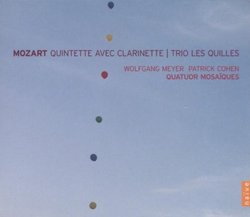| All Artists: Wolfgang Amadeus Mozart, Quatuor Mosaiques, Patrick Cohen Title: Mozart: Clarinet Quintet; Kegelstatt Trio Members Wishing: 1 Total Copies: 0 Label: Valois Original Release Date: 1/1/2006 Re-Release Date: 8/29/2006 Genre: Classical Styles: Chamber Music, Historical Periods, Classical (c.1770-1830) Number of Discs: 1 SwapaCD Credits: 1 UPC: 822186050590 |
Search - Wolfgang Amadeus Mozart, Quatuor Mosaiques, Patrick Cohen :: Mozart: Clarinet Quintet; Kegelstatt Trio
 | Wolfgang Amadeus Mozart, Quatuor Mosaiques, Patrick Cohen Mozart: Clarinet Quintet; Kegelstatt Trio Genre: Classical
|
Larger Image |
CD Details |
CD ReviewsTwo of Music's Earliest and Greatest Chamber Masterworks wit J Scott Morrison | Middlebury VT, USA | 09/05/2006 (5 out of 5 stars) "Mozart's Kegelstatt* Trio for clarinet, viola and piano (and sometimes played by clarinet, violin and piano, or even violin, viola and piano) was one of the earliest true masterpieces featuring a clarinet. The instrument itself had been invented about eighty years earlier and as late as 1750 was described in an encyclopedia as 'a kind of oboe'! Although there had been some earlier pieces featuring clarinet, none came anywhere near the two pieces featured here. And here we have marvelous performances by one of my favorite string quartets, Quatuor Mosaïques, an original instruments group who are the crème de la crème of such groups. And the clarinetist with them is Wolfgang Meyer who plays a basset clarinet, that instrument that allows the clarinetist to play a third lower than the usual instrument; Mozart made use of this range in both these works as well as in his Clarinet Concerto. I'm not terribly fond of the sound of the Hammerflügel that Patrick Cohen plays in the Trio, but that's my idiosyncratic response to most instruments of that period. He's an excellent player, though, and is of one mind with his colleagues.
*'Kegelstatt' is German for 'skittles,' an early form of bowling. Legend has it that Mozart composed the Trio during a game of skittles. The performances here are, to quote Linda Richman, 'like buttah.' I honestly cannot think of a single criticism of the level of playing here, either technically, sonically or, most important, musically. The Quatuor Mosaïques has recorded all of Mozart's string quartets in a universally acclaimed set and they obviously have his style in their bones. A striking feature in the Quintet is that it can sometimes seem to be a double concerto for violin and clarinet with string accompaniment, and to take advantage of that the stereo soundstage places the first violin predominantly in the left channel, the clarinet in the right. This is a very nice effect sonically. Fun fact: it was the Clarinet Quintet that Major Charles Emerson Winchester taught the Chinese prisoners of war to play in an episode of M*A*S*H. I've actually had someone tell me that they were 'turned on to classical music' by that episode. I believe these excellent 1993 performance were previously released on Auvidis but it appears to be no longer available and I'm glad Naïve has made it available again. Note that the CD comes at what appears these days to be mid-price. Scott Morrison" |

 Track Listings (7) - Disc #1
Track Listings (7) - Disc #1